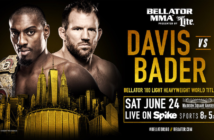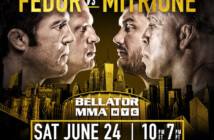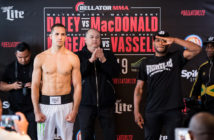
Anderson Silva is the most dominant fighter in UFC history with the middleweight champion having gone undefeated in the Octagon since his debut in 2006, amassing a record-breaking eleven consecutive victories and six successful title defenses. Over the past four years he’s beaten every fighter the UFC has put in front of him but there’s one challenge that has always seemed beyond Silva, connecting with the organization’s paying fans. His title fights have usually underperformed on pay per view, with Silva unable to capture the attention of casual fight fans with his title defenses.
The conventional wisdom is that the blame rests solely with Anderson Silva due to his failure to act in a way that will truly excite fans. There is undoubtedly some truth to this, with Silva often unwilling to engage in the type of bravado and trash talking that has been key to the success of the most popular fighters and the biggest fights. And while Silva has several exciting fights on his UFC resume, many fans still struggle to forgive either his safety-first tactics against Patrick Cote and Thales Leites or his bizarre refusal to finish a clearly outclassed Demian Maia at UFC 112. But while Silva’s performances have sometimes alienated fans, that’s not the sole reason for his failure to properly connect with them/
Silva’s struggles commercially over the past few years can in part be traced back to the UFC not properly introducing him before giving him a world title shot. Silva challenged for the world title in only his second fight with the organization, having impressed UFC President Dana White by demolishing Chris Leben in his debut. By fast-tracking Silva, White denied ‘The Spider’ the opportunity to develop a following within the UFC before becoming champion. Instead of being a dominate contender challenging for the title in a long awaited showdown with the champion, Silva was still largely unknown when he defeated Rich Franklin to win the title at UFC 64.
And Silva’s name recognition was not only helped by the championship, with the Middleweight Title lacking prestige having only been resurrected the year prior to Silva winning it. Unlike welterweight or light heavyweight, middleweight wasn’t a glamour division within the organization, having produced only one bona fide superstar in Rich Franklin. This meant that outside of his title defense against the former champion, Silva was usually facing fighters that were largely unknown to casual fans.
No one should absolve Silva of all the blame for the poor commercial performance of his fights, but nor should they make him solely responsible for their relative failure. The UFC did not give him enough time to connect with the fans as a contender nor should the challenge of leading a new division be overlooked. Silva would become frustrated with the lack of fan interest in his fights, especially as his pay was linked to his performance on pay per view. Silva would respond by seeking superfights against either light heavyweights such as Forrest Griffin or the boxer Roy Jones Jr.
While the UFC would allow him to occasionally venture out of the middleweight division, they focused on mitigating his lack of box office appeal by always ensuring that his fights were on the strongest possible shows. His defense against Thales Leites at UFC 96 was supported by Chuck Liddell vs. Shogun Rua in what was billed as ‘The Iceman’s’ retirement fight. His superfight against Forrest Griffin at UFC 101 was the co-main event to the eagerly anticipated lightweight title fight between BJ Penn and Kenny Florian. And at UFC 112 his infamous match against Demian Maia was part of a championship double header with BJ Penn vs. Frankie Edgar. Ensuring that Anderson Silva wasn’t left to carry the box office all by himself worked, with all three events surpassing the 500,000 buys mark whereas previously Silva was struggling to break 300,000.
It’s a tactic that the UFC is repeating this Saturday with UFC 117 having a stacked undercard including a final eliminator for the heavyweight title between Roy Nelson and Junior Dos Santos, a long-delayed rematch between top welterweight contenders Thiago Alves and Jon Fitch and fights involving popular lightweight Clay Guida and the former welterweight champion Matt Hughes. Ironically this is the one Anderson Silva title defense that doesn’t need such a stellar supporting cast, with challenger Chael Sonnen having caught everyone’s attention by mercilessly mocking and insulting the champion for the past four months. And for once the softly spoken champion is giving as good as he’s getting, with his increasingly eccentric behavior and the cheerleading from his manager Ed Soares creating the perfect foil for Sonnen’s all-American motormouth shtick. The UFC may have given Silva vs. Sonnen a stacked undercard in preparation for a substandard level of fan interest, but for once everyone is talking about what will happen in the Anderson Silva fight on Saturday.



